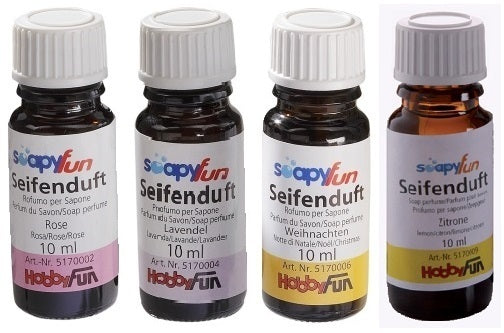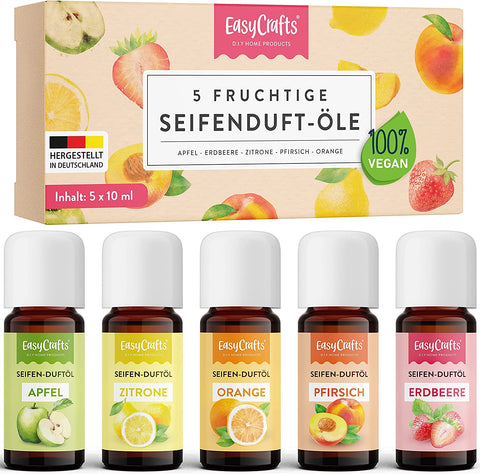Fragrance oils are an important ingredient in the manufacture of soaps. Not only do they give the soaps a pleasant scent, they also have a positive effect on the skin. But which fragrance oils are best suited for soap making? In this article, we're going to take a look at that question and give you some tips on how to find the perfect scented oil for your soap.
There are many scented oils that are suitable for soap making. Some popular options are lavender, citrus, peppermint, and eucalyptus. It's important to make sure the oil is skin-safe and not overused, as it can soften the soap. Always test a small amount before adding larger amounts. It is best to use essential oils to get natural scents.

Which fragrance oils are best for soap making?
1. Essential oils for soap making
When it comes to flavoring soaps, essential oils are your best bet. More natural than synthetic fragrance oils, they offer a variety of health benefits depending on which oils you choose. Essential oils are derived from plants and are known for their therapeutic properties. However, they can be more expensive than synthetic oils.
Some of the most popular essential oils for soap making are lavender, peppermint, lemongrass, rosemary, and eucalyptus. You can also mix different oils to create your own unique fragrance combination.
2. Synthetic fragrance oils for soap making
Synthetic fragrance oils are a cheaper alternative to essential oils. They are made in the lab and can mimic a variety of scents found in nature. However, synthetic fragrance oils are not as natural as essential oils and offer no health benefits.
Some of the most popular synthetic fragrance oils for soap making are vanilla, strawberry, apple and cinnamon. There are also many other scents to choose from depending on what type of soap you want to make.
3. Natural fragrances for soap making
Natural fragrances can come from a variety of sources, including herbs, spices, and fruits. They are a more natural alternative to synthetic fragrance oils and also offer some health benefits.
Some of the most popular natural fragrances used in soap making are cinnamon, ginger, orange and lemon. You can also use different herbs and spices to create your own unique fragrance combination.
4. Benefits of using essential oils for soap making
Essential oils offer many health benefits depending on which oils you choose. Some of the benefits can be:
– Calming down stress and anxiety
– Improve sleep quality
- Relief of pain and inflammation
– Improving skin health
5. Benefits of using synthetic fragrance oils for soap making
Synthetic fragrance oils are a more affordable alternative to essential oils and offer a variety of scents to choose from. Some of the benefits can be:
– Inexpensive
– A wider range of fragrances to choose from
– Longer lasting fragrance
6. Vs of essential and synthetic fragrance oils for soap making
When it comes to choosing between essential and synthetic fragrance oils, there are pros and cons to both options. Some of the Vs can be:
Essential Oils:
– More natural and offer health benefits
- More expensive
– Can be more difficult to mix
Synthetic fragrance oils:
- Less expensive
– A wider range of fragrances to choose from
– Not as natural and offer no health benefits
7. How to use fragrance oils in soaps
To use scented oils in soaps, you need to add them in the right amount. A good rule of thumb is to use 1 ounce of fragrance oil per pound of soap base. However, you can adjust the amount depending on the scent you want.
It is also important to add the fragrance oil at the right time. If you use essential oils, you should add them after melting the soap base. If you use synthetic fragrance oils, add them after adding colorants.
8. How to create your own scented oil blends for soap making
You can create your own unique soap making fragrance combination by mixing different essential oils. Here is an example of a fragrance blend:
– 10 drops of lavender oil
– 5 drops of peppermint oil
– 3 drops of lemongrass oil
You can also mix different synthetic fragrance oils to create your own fragrance combination.
9. Table of the most popular fragrance oils for soap making
Here is a chart of some of the most popular scented oils for soap making:
| fragrance oil | Art of the Duftöls |
| — | — |
| Lavender | Essential Oil |
| peppermint | Essential Oil |
| lemongrass | Essential Oil |
| Rosemary | Essential Oil |
| Eucalyptus | Essential Oil |
| Vanilla | Synthetic Fragrance Oil |
| strawberry | Synthetic Fragrance Oil |
| Apple | Synthetic Fragrance Oil |
| Cinnamon | Natural Perfume |
| Ginger | Natural Perfume |
| Orange | Natural Perfume |
| lemon | Natural Perfume |
10. Conclusion
Choosing the right scented oil for soap making depends on your individual preferences and needs. Essential oils are more natural and offer health benefits, but can be more expensive. Synthetic fragrance oils are less expensive and offer a wider range of fragrances. Natural fragrances are also a good option as they are more natural than synthetic fragrance oils. No matter which option you choose, make sure you add the fragrance oil at the right time and in the right amount for the best result.
frequently asked Questions
Here are some of the frequently asked questions about using fragrance oils in soap making:
1. Which fragrance oils are best suited for soap making?
There are many different types of fragrance oils that can be used in soap making. Some of the most popular options are essential oils like lavender, lemongrass, peppermint, and eucalyptus. These oils are powerful and can help your soap smell nice and have therapeutic properties as well.
You can also use perfume oils to add a special scent to your soap. However, these oils may not be as natural as essential oils and may contain synthetic fragrances.
2. How much fragrance oil should I use for one batch of soap?
The amount of fragrance oil you should use in a batch of soap will depend on the size of your batch and the intensity of the fragrance you are trying to achieve. As a rule of thumb, you should use about 1 ounce of fragrance oil per pound of soap base.
If you want a stronger aroma, you can add more fragrance oil. However, it is important to be careful as too much fragrance oil can make your soap smell too strong or the oil can affect the consistency of your soap.
3. How do I add fragrance oil to my soap batch?
It's best to add the fragrance oil to your soap base after you've melted it and added everything else. Once your soap base is liquid, you can add your fragrance oil and mix thoroughly.
It is important to ensure the oil is fully incorporated into the soap base before pouring your soap molds. This will ensure that the fragrance is evenly distributed and that your soap smells great.
4. Is it safe to use essential oils in soaps?
Yes, it is safe to use essential oils in soaps. In fact, essential oils can help your soap have therapeutic properties and smell nice too. However, it's important to make sure you're using high-quality, pure essential oils and that you're using the right amount to ensure they're safe.
Some essential oils can cause skin irritation if used in excess. It's important to research carefully and stick to recommended amounts to ensure your soap is safe and enjoyable to use.
5. Can I use fragrance oils to color my soap?
No, fragrance oils are not intended to color soap. They are used to add a pleasant scent to your soap. If you want to color your soap, you should use dyes or pigments that are specifically designed for soap making.
It's also important to note that some fragrance oils can affect the color of your soap. If you want a specific color for your soap, you'll want to make sure you're using the right fragrance oil to ensure it doesn't interfere with the color of your soap.

In soap making, essential oils are an important ingredient to give the soap a pleasant scent. There are a variety of fragrance oils to choose from, but which are the best for soap making?
First of all, the choice of fragrance oils depends on your personal taste and the desired properties of your soap. Some of the most popular scented oils for soap making are lavender, citrus, peppermint, and eucalyptus. Not only do these oils have pleasant scents, but they also have various therapeutic properties that can add additional benefits to your soap.
If you're looking for something out of the ordinary, you can also try more exotic fragrance oils like ylang-ylang, sandalwood, or patchouli. These oils have strong, unique scents that can add a special touch to your soap.
Overall, there are many different scented oils that you can use to make soap. Experiment with different oils to find the perfect scent for your soap. With the right selection of fragrance oils, you can make a soap that not only smells great, but also nourishes and pampers your skin.


